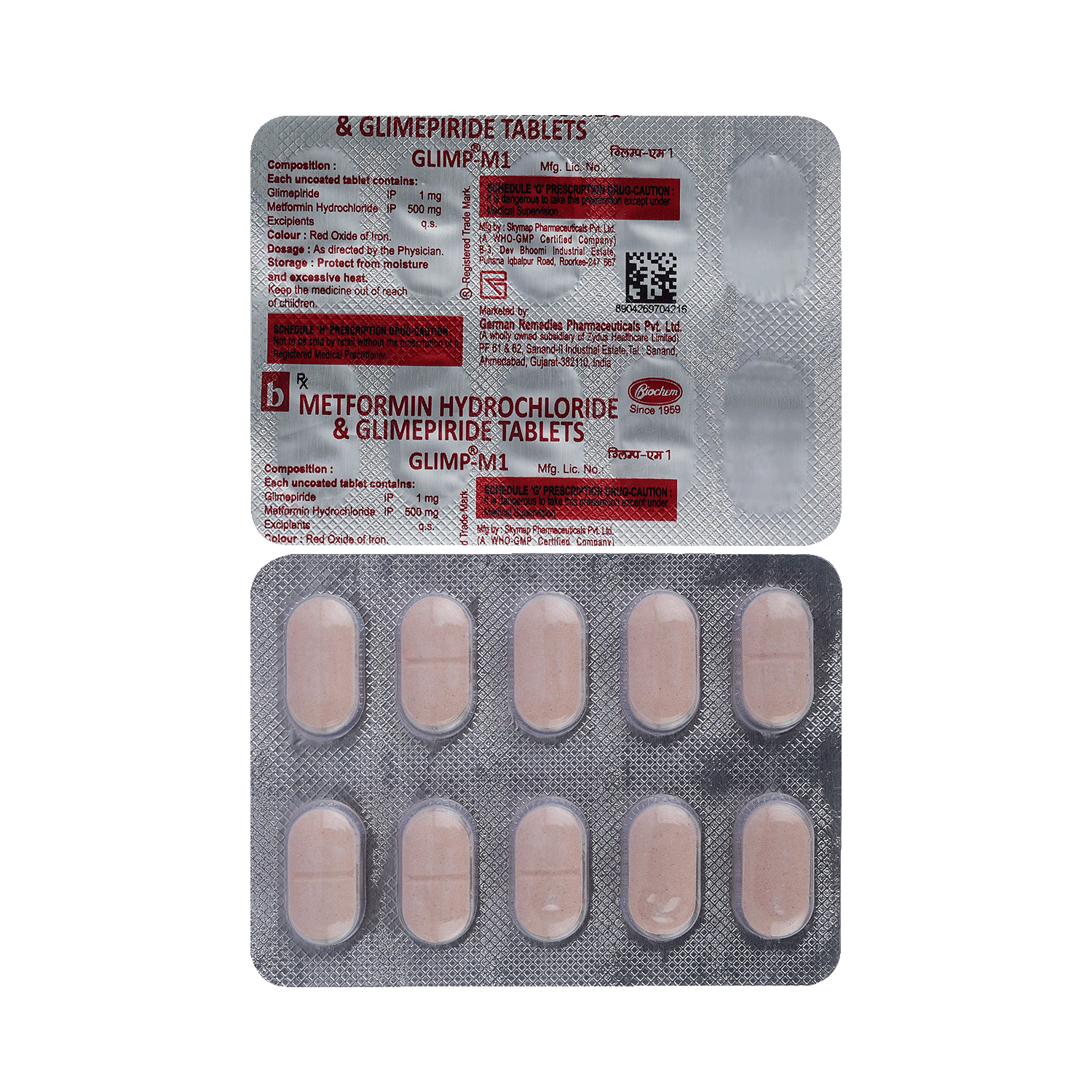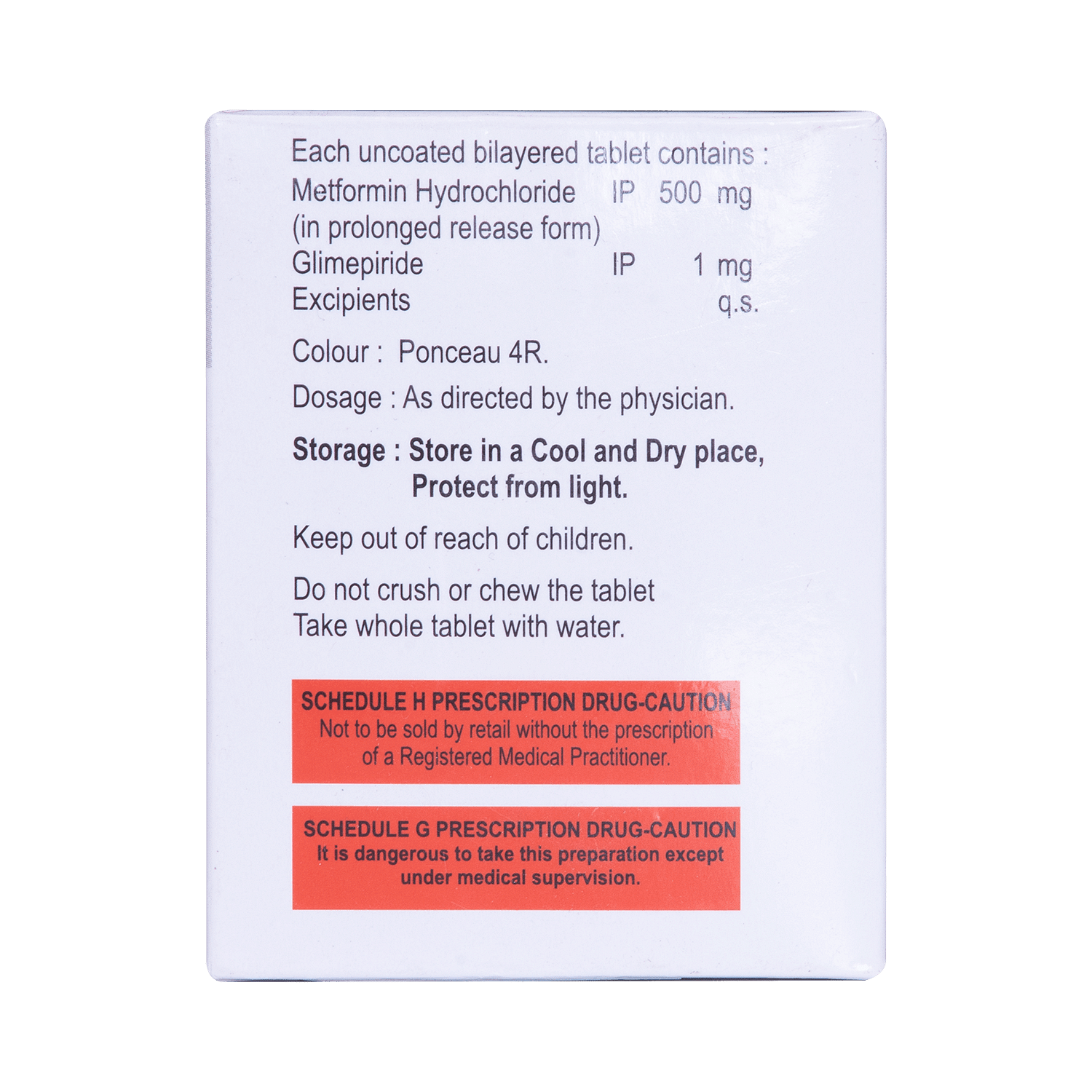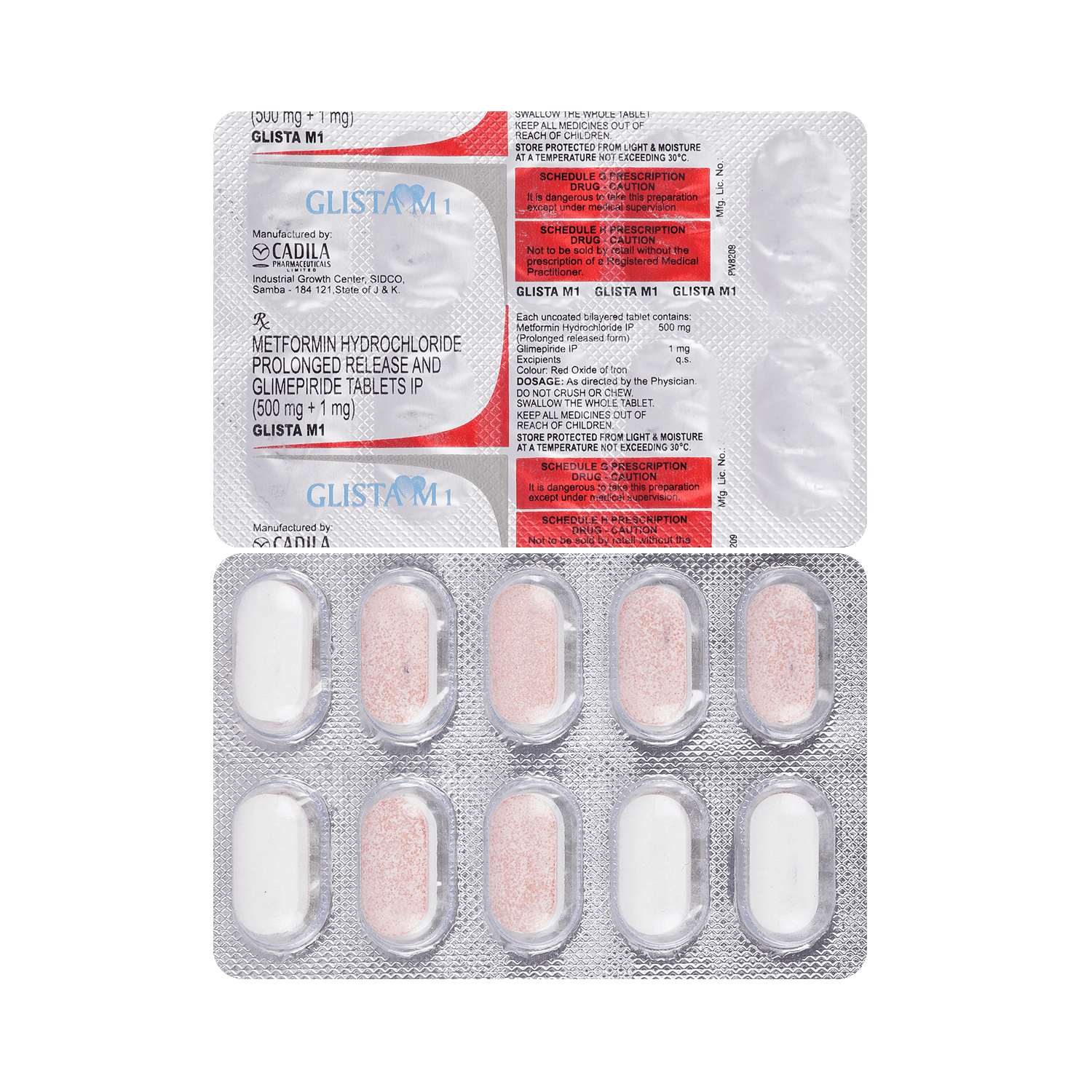
Impride-M 1 Tablet
Manufacturer
Vanshita Lifecare
Salt Composition
Glimepiride (1mg) + Metformin (500mg)
Key Information
Short Description
Impride-M 1 Tablet is a combination of two medicines used to treat type 2 diabetes mellitus in adults. It helps control blood sugar levels in people with diabetes.
Dosage Form
Tablet
Introduction
Impride-M 1 Tablet belongs to a category of medicines known as anti-diabetic drugs. It is a combination of two medicines used to treat type 2 diabetes mellitus in adults. It helps control blood sugar levels in people with diabetes.
Directions for Use
Take this medicine in the dose and duration as advised by your doctor. Swallow it as a whole. Do not chew, crush or break it. Impride-M 1 Tablet is to be taken with food.
Safety Information
Side Effects
Inform your doctor about your diabetes treatment if you are due to have surgery under a general anesthetic. Tell your doctor immediately if you experience any deep or rapid breathing or if you have persistent nausea vomiting and stomach pain as Impride-M 1 Tablet may cause a rare but serious condition called lactic acidosis which is an excess of lactic acid in the blood.
Alcohol Warning
It is unsafe to consume alcohol with Impride-M 1 Tablet.
Breastfeeding Warning
Impride-M 1 Tablet is unsafe to use during breastfeeding. Data suggests that the drug may cause toxicity to the baby.
Pregnancy Warning
Impride-M 1 Tablet may be unsafe to use during pregnancy. Although there are limited studies in humans, animal studies have shown harmful effects on the developing baby. Your doctor will weigh the benefits and any potential risks before prescribing it to you. Please consult your doctor.
How it works
Impride-M 1 Tablet is a combination of two antidiabetic medicines: Glimepiride and Metformin. Glimepiride is a sulfonylurea which works by increasing the amount of insulin released by the pancreas in order to lower the blood glucose. Metformin is a biguanide which works by lowering glucose production in the liver, delaying glucose absorption from intestines and increasing the body's sensitivity to insulin.
Quick Tips
Take it with food to lower your chance of having an upset stomach. Monitor your blood sugar level regularly while you are taking this medicine. It can cause hypoglycemia (low blood sugar level) when used with other antidiabetic medicines, alcohol or if you delay or miss a meal. Inform your doctor about your diabetes treatment if you are due to have surgery under a general anesthetic. Tell your doctor immediately if you experience any deep or rapid breathing or if you have persistent nausea, vomiting, and stomach pain as Impride-M 1 Tablet may cause a rare but serious condition called lactic acidosis, which is an excess of lactic acid in the blood.
Related Medicines

Glimfirst M1 Tablet

Glimp-M 1 Tablet

Metffil G1 Tablet

Gamaryl M 1mg/500mg Tablet

Idepride Plus 1mg/500mg Tablet

Fachek Forte 1mg/500mg Tablet

Glimetor MF 1mg/500mg Tablet

Metwin G 1mg/500mg Tablet

D Pride M 1mg/500mg Tablet

Glista M 1 Tablet
Frequently asked questions
What are the recommended storage conditions for Impride-M 1 Tablet?
Store Impride-M 1 Tablet in its original container, tightly closed, and according to the instructions provided on the packaging or label. Dispose of any unused medication and ensure it is not accessible to pets, children, or other individuals.
Can the use of Impride-M 1 Tablet lead to lactic acidosis?
Yes, the use of Impride-M 1 Tablet can lead to lactic acidosis, a rare but serious medical emergency characterized by elevated blood lactate levels. This condition is more likely to occur in patients with underlying kidney disease, older adults, or those who consume large amounts of alcohol. Symptoms may include muscle pain or weakness, dizziness, fatigue, cold intolerance, difficulty breathing, nausea, vomiting, abdominal pain, or slow heart rate. If you experience these symptoms, discontinue Impride-M 1 Tablet and consult your doctor immediately.
What is Impride-M 1 Tablet?
Impride-M 1 Tablet is a combination medication containing Glimepiride and Metformin. It is used to treat type 2 diabetes mellitus (DM) in adults, in conjunction with a healthy diet and regular exercise. Glimepiride increases insulin release from the pancreas, while Metformin reduces glucose production in the liver and improves insulin sensitivity. This combination is not indicated for the treatment of type 1 DM.
What are the possible side effects of Impride-M 1 Tablet?
Common side effects of Impride-M 1 Tablet include hypoglycemia (low blood sugar), altered taste, nausea, stomach pain, diarrhea, and headache. Rare but serious side effects may include lactic acidosis. Long-term use can also lead to Vitamin B12 deficiency, which may cause anemia, nerve problems, and symptoms such as tingling sensations, numbness, weakness, urinary issues, changes in mental status, and balance difficulties.
Can the use of Impride-M 1 Tablet lead to Vitamin B12 deficiency?
Yes, the use of Impride-M 1 Tablet can cause Vitamin B12 deficiency on long-term use, as it interferes with stomach absorption. Untreated deficiency may lead to anemia, nerve problems, and symptoms such as tingling sensations, numbness, weakness, urinary issues, changes in mental status, and balance difficulties. To prevent these issues, consider taking Vitamin B12 supplements at least once a year.
Can the use of Impride-M 1 Tablet cause hypoglycemia?
Yes, Impride-M 1 Tablet can cause hypoglycemia (low blood sugar). Symptoms may include nausea, headache, irritability, hunger, sweating, dizziness, rapid heart rate, and feelings of anxiety or shakiness. This is more likely to occur if you miss or delay meals, consume alcohol, over-exercise, or take other antidiabetic medications. Regular blood sugar monitoring is essential, and it is recommended to keep a quick source of sugar, such as glucose tablets, honey, or fruit juice, readily available.
Is it safe to take alcohol while I am also taking Impride-M 1 Tablet?
No, it is not recommended to consume alcohol while taking Impride-M 1 Tablet, as it may lower blood sugar levels and increase the risk of hypoglycemia and lactic acidosis.


